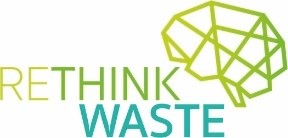The main objective of REthinkWASTE was to provide public authorities with a plug and play model based on the pay-as-you-throw (PAYT) and know-as-you-throw (KAYT) paradigm.
Project funded by the European Commission under the LIFE programme, 2019 - 2022.
Highlights
The final event of the LIFE REthinkWASTE project took place in the Ecomondo expo. Participants heard about the impact of the adoption of integrated PAYT+KAYT models in different EU cities and regions. Furthermore, LIFE REthinkWASTE experts presented a Decision Support System and an Online Toolkit that helped participants to understand if dynamic waste pricing models are suitable and how to plan their use in the most effective manner.
THE PROJECT
The goal was to increase separate collection of waste, reduce residual waste per capita and boost the recovery rate, whilst simultaneously cutting the average household waste bill. This was pursued by adapting waste management plans and addressing other drivers (e.g. regulation, financial plans, waste management service contracts), based on a combined approach of PAYT and KAYT.
The projects specific objectives were to test the concept of KAYT in four local systems (in 51 municipalities in central Veneto managed by Etra, in Sant Just, Spain, and in Bitetto and Varese, Italy) side by side with the PAYT approach. Also, it aimed to incorporate the PAYT and KAYT paradigm within the municipal waste management regulations of the four pilot sites, with the final goal of reducing the yearly quantity of unsorted waste produced and increasing the tariff spread between virtuous and underperforming citizens. To finish, the project provided about 230 municipalities in the EU with customisable waste strategies, service schemes and business plans to trigger a change in mindset among policy-makers and civil officials, which will, in turn, spark a shift from a traditional tariff system to a variable one (PAYT) combined with a pioneering persuasion approach (KAYT).
ACTIVITIES
ACR+ contributed to find synergies with other EU funded projects and capitalize from experiences from its network, in order to properly set the state of the art about PAYT/KAYT schemes. ACR+ then involved some of the local authorities among the members to test the decision support system (DSS) which have been developed as part of the project activities. Furthermore, ACR+ coordinated the setting up of a toolkit composed by 6 modules and tutorials that were implemented to coach at least 50 municipalities in 5 EU regions (mainly in Mediterranean and South-East Europe). The project dissemination was also in the focus: on top of regular communication activities, ACR+ organised a media forum and the project final conference (both events took place in Brussels).
PAYT and KAYT Catalogue
Looking for examples of differentiated taxation or awareness raising models to improve separate waste collection and reduce waste? LIFE Rethink Waste published a compilation of a dozen recent practices in pay as you throw and know as you throw, using taxation, information, and technology to improve waste performances. It covers cities from six countries (Belgium, Germany, Italy, Portugal, Spain, and The Netherlands), ranging from municipalities with a few thousand inhabitants like Argentona (ES) and Miglianico (IT) to medium-sized cities like Parma and Bergamo (IT,) and to European metropoles like Berlin (DE). A set of nine cluster projects accompany the description of these experiences to frame them in a broader context.
The source of inspiration for this collection was a workshop organised by ACR+ for the project in February 2020. The event gathered experts from different European countries, who discussed how the cities and towns in their regions were able to incentivise residents to separate their waste more and to prevent waste. They concluded that, so far, PAYT has not managed to completely solve the inherent injustice of taxation, because certain communities like newcomers to cities continue to be disadvantaged; that the environmental benefits of PAYT and increased rates of separate collection need to be well and frequently communicated to residents for PAYT to work; that, in some cases, PAYT and KAYT are schemes that can pay for themselves; and that the social, environmental, and economic benefits of these schemes are very closely interlinked.
Layman report
The LIFE REthinkWASTE project published the Layman report as a summary of the evidence produced during the project. Some of the lessons learnt during the project are: The Know-As-You Throw (KAYT) approach can complement or be a simplified alternative to Pay-As-You-Throw (PAYT) waste management programs. KAYT's direct communications characterized by engaging messages can encourage users to improve their behaviour towards waste management. The data collected through KAYT can be used to improve performances of local waste collection, and send personalised and updated messages to users, nudging them towards better waste management practices. KAYT can motivate citizens towards waste management by conveying that separate waste collection is both an individual act and a collective responsibility for the environment.
PARTNERS INVOLVED
REthinkWASTE’s project leader was ETRA, Energia Territorio Risorse Ambientali (IT), and its project partners were:
- ACR+, Association of Cities and Regions for sustainable Resource management (BE)
- Bitetto, Municipality of Bitetto (IT)
- Sant Just Desvern, Municipality of Sant Just Desvern (ES)
- Varese, Municipality of Varese, Lombardia (IT)
- ARC*, Agència de Residus de Catalunya (ES)
- ATA, Assemblea Territoriale d'Ambito ATO2 Ancona (IT)
- IFEL, Istituto per la Finanza e l'Economia Locale (IT)
- ARS, ARS Ambiente Srl (IT)
- 0 LCA, 2.-0 LCA consultants ApS (DK)
- ARPAV, Agenzia Regionale per la Prevenzione e Protezione Ambientale del Veneto (IT)
*ACR+ member







